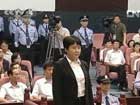| Videos | • Latest |
|
• Feature | • Sports | • Your Videos |
Details released on Bo-gu Kailai trial

 0 Comment(s)
0 Comment(s) Print
Print E-mail CNTV, August 11, 2012
E-mail CNTV, August 11, 2012
Xinhua News Agency has released a lengthy report on the trial of Bo-gu Kailai and Zhang Xiaojun, who have been charged with the intentional homicide of Britain Neil Heywood. The report gives very detailed information about their alleged plot. The two defendants have both admitted to their charges.
On the morning of August 9, 2012, the intentional homicide trial involving Bogu Kailai and Zhang Xiaojun, started at the intermediate People's Court in Anhui's provincial capital Hefei City. It was attended by some 140 people, including the two defendents, Bogu Kailai and Zhang Xiaojun, the victim Neil Heywood's relatives, officials from the British embassy in China, reporters, NPC deputies and CPPCC members, attended. The procuratorate presented the evidence, and the two defendents made their own statements. Afterwhich their lawyers set out their defence. The lawyer for Neil Heywood's relatives also made a statement at the court. The first trial lasted about 7 hours. The court will announce the verdict on a later date.
According to Bo-gu Kailai's statement, she and her son got acquainted with Heywood in 2005. She soon arranged for Heywood to act as agent for a company, and introduced him to participate in planning a land development program. Heywood was said to have later rowed with Bogu Kailai's son over a payment dispute, and threatened to harm him. Evidence from the procuratorate shows Bogu Kailai later learnt of this dispute. Concerned for her son's safety, she hatched the plot to kill Heywood.
The report says, the procuratorate submited Zhang Xiaojun's testimony, showing that on November 12, 2011, Bogu Kailai asked him to contact Heywood and take him to Chongqing to meet her. The airplane tickets and hotel check-in records show that Heywood, accompanied by Zhang Xiaojun, arrived in Chongqing on November 13, 2011. Heywood was ushered in to a hotel in Nan'an district.
The procuratorate also presented the testimonies made by Bogu Kailai and Zhang Xiaojun, that says at around 9 p.m. that same day, Bogu Kailai and Zhang Xiaojun came to the hotel, carrying bottles filled with cyanide poison and toxic capsules, as well as some liquor and tea. Bogu Kailai visited Heywood at his hotel room and drank together. Heywood subsequently got drunk and fell in the bathroom. Bogu Kailai asked Zhang Xiaojun to enter the room and hand her the poison. Heywood was said to have vomitted and requested a drink of water, at which Bogu Kailai fed him the poison. She then placed the capsules on the floor to make it seems as if Heywood died of an overdose.
According to the report, the procuratorate's evidence shows Guo Weiguo, who was then deputy chief of the Chongqing public security bureau, was appointed by then vice mayor and police chief Wang Lijun to lead the case. Guo and fellow police officers found Bogu Kaili highly suspect. But they covered up her presence at the crime spot, by means of falsifying police reports and hiding material evidence.
According to the report, the Hefei City Intermediate People's Court charged the case as intentional homicide, in which the victim's life was illegally deprived. In the face of the law, everyone is equal. In the drive to build a socialist legal system, anyone who violates the law should be held responsible.
The report says Bogu Kailai said in her last statement she accepted the facts in the charges. She said the case had caused great loss to the party and the country, and she should be held responsible and was willing to face the verdict. She added she is expecting a fair judgment from the court. Zhang Xiaojun also said in his last statement that he accepted the charges of his illegal acts.






Go to Forum >>0 Comment(s)